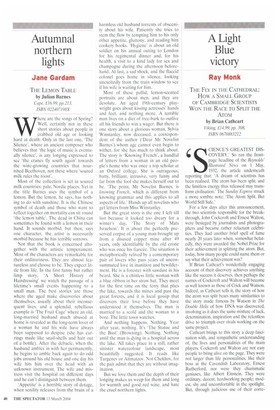Autumnal northern lights
Jane Gardam
THE LEMON TABLE by Julian Barnes Cape, £16.99, pp.213. ISBN 022407198X Where are the songs of Spring? Well, certainly not in these short stories about people in crabbed old age or looking hard at death. Only in the last one, 'The Silence', where an ancient composer who believes that 'the logic of music is eventually silence', is any longing expressed to see 'the cranes fly south again' towards the wine-growing countries that nourished Beethoven, not these where 'soured milk rules the roost'.
Most of the collection is set in soured milk countries: pale, Nordic places. Yet in the title Barnes uses the symbol of a lemon. But the lemon, he says, has nothing to do with sunshine. It is the Chinese symbol of death and those who want to reflect together on mortality can sit round 'the lemon table'. The dead in China can sometimes be found with a lemon in their hand. It sounds morbid, hut then, says one character, the artist is necessarily morbid because he has terrible sorrows.
Not that the book is concerned altogether with the artistic temperament. Most of the characters are remarkable for their ordinariness. They are almost featureless and choose to be. They expect little from life. In the first funny but rather limp story, 'A Short History of Hairdressing' we watch the passage of a lifetime's small events happening to a small man. The best stories are those where the aged make discoveries about themselves, usually about their inconsequent lives, and a splendid, rebellious example is 'The Fruit Cage' where an old, long-married husband much abused at home is revealed as the long-term lover of a woman he and his wife have always been supposed to despise (she has earrings made like snail-shells and hair out of a bottle). After the debacle, when the husband ambles in with her permanently, he begins to amble back again to do odd jobs around his old house and one day his wife hits him over the head with an unknown instrument. The wife and mistress visit the hospital on different days and he can't distinguish between them.
'Appetite' is a horrible story of dotage, when senility releases from the brain of a harmless old husband torrents of obscenity about his wife. Patiently she tries to stem the flow by tempting him to his only other appetite, gluttony, and reading him cookery books. 'Hygiene' is about an old soldier on his annual outing to London for his regimental dinner and, for his health, a visit to a kind lady for sex and champagne during the afternoon beforehand. At last, a sad shock, and the flaccid colonel goes home in silence, looking unexcitedly from the train window to see if his wife is waiting for him.
Most of these pallid, lemon-scented portraits are about men, and they are desolate. An aged 19th-century playwright goes about kissing actresses' hands and feet, and nothing more. A terrible man lives on a diet of tree-bark to outlive all his friends to win a wager. But there is one story about a glorious woman, Sylvia Winstanley, now deceased, a correspondent of the author (`Dear Mr Novelist Barnes') whom age cannot even begin to wither, for she has much to think about. The story is 'Knowing French', a handful of letters from a woman in an old people's home who was once a top scholar at an Oxford college. She is outrageous, batty, brilliant, intrusive, very funny and far from the fool she makes herself out to he. 'The point, Mr Novelist Barnes, is knowing French, which is different from knowing grammar and this applies to all aspects of life.' Hands up all novelists who get letters from Miss Winstanley.
But the great story is the one I left till last because it looked too dreary for a winter's day, 'The Story of Mats Israelson'. It is about the perfectly preserved corpse of a young man brought up from a disused copper mine after 49 years, only identifiable by the old crone who was once his fiancée. The situation is metaphorically relived by a contemporary pair of lovers who pass years of unconsummated love in inanition and bewilderment. He is a forester with sawdust in his beard. She is a chinless little woman with a blue ribbon in her straw hat. They meet for the first time on the ferry that plies the lake, towards the mines and past the great forests, and it is local gossip that discovers their love before they have understood it themselves. The man is married to a scold and the woman to a bore. The little town watches.
And nothing happens. Nothing. Year after year, nothing. It's 'The Statue and the Bust' (Browning). Nothing. Nothing until the man is dying in a hospital across the lake. All takes place in a still, rather sinister watercolour landscape, most beautifully suggested. It reads like Turgenev or Aitmatzov. Not Chekhov, for the pair admit that they are without imagination.
But we love them and the depth of their longing makes us weep for them and long for warmth and good red wine, and hate the cruel northern lights.


































































 Previous page
Previous page